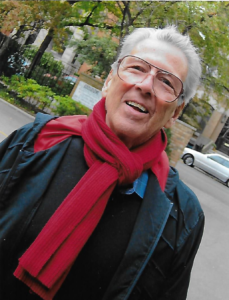Mondays with Mike: In the flesh
November 1, 2021 • 2 Comments • Posted in Mike Knezovich, Mondays with MikeI’ve missed a couple Mondays recently, and for that, I apologize. The first was owed to exhaustion. On October 10 I left for Tarrytown, New York, the start of a weeklong effort to put on…gulp…an in-person conference. The non-profit I work for—Phius—puts on an annual conference and after a virtual shindig last year, we gathered again. We limited it to smaller-than-usual numbers, and I’m happy to report it was an enormous success. But I returned a week later utterly exhausted, like my co-workers.
We had 400 people and 30 exhibitors, and they all behaved. Masks were worn, and the weather cooperated, allowing us to gather outside between sessions and soak up beautiful weather in the Hudson Valley.
We were near Tappan Zee, a three-mile-wide span of the Hudson River. On the evening of the last day of the conference,

The Tappan Zee bridge from our riverside soiree perch (that’s the moon on the right–it was a nice nightL). To see the NYC skyline, we needed only to swivel our heads left.
we held a ticketed party at a former factory building that had been converted to a bistro. We owned the place that night. And again, the weather was fantastic. We had enough indoor space for all of us, but we mostly were outside on the third-floor deck or at tables on the shore of the Hudson. To our right was the spectacularly lit Tappan Zee bridge, and to our left was the New York City Skyline.
It was the cherry on top of a luscious sundae.
We made a decision earlier this year to forge ahead. No virtual conference. No Zoom. No virtual rooms or virtual trade shows.
The months and then weeks in advance brought nightmares about what could go wrong. There was good reason to fret. To start, the hotel had lost its affiliation with Hilton in the midst of Covid. And like everyone in the hospitality business, they couldn’t get staff.
Several weeks before the event, the remnants of Hurricane Ida tore through, dropping eight inches of rain in a few hours, and flooding the lower level of the hotel—where we’d intended to hold some breakout sessions.
And of course, the pandemic.
Somehow, we pulled it off. Our constituents are smart and ethical, so we were confident of a high vaccination rate and of thoughtful behavior at the event.
Knock wood, no illness reported thus far.
We have received reports of elation. About the joy of being in the same place at the same time. About richly rewarding and productive serendipitous conversations that can only happen in person. That can’t happen at intentional virtual meetings.
It’s a new world, I get that. And one where we probably should meet less often, fly less, generate fewer emissions, and make the most of technology.
But don’t ever give in to the last couple years becoming the new normal. I’ve never seen such joy and energy as I did in New York.
We need each other, in three dimensions.


